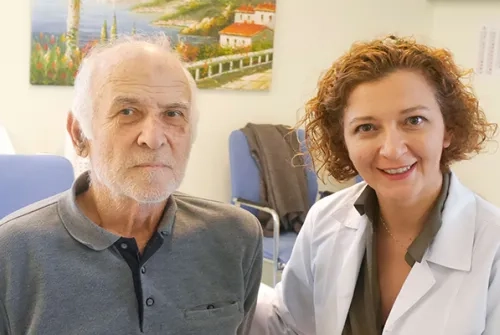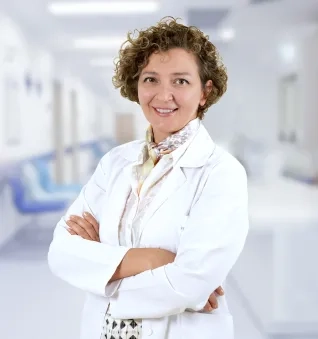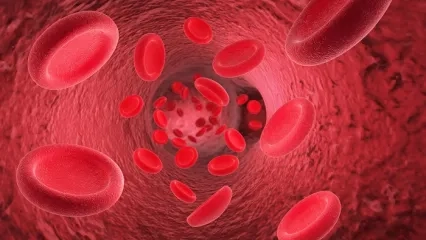Alo Yeditepe
Alo Yeditepe
The Giant Stones In The Biliary Tract Of 71-Year-Old Patient Were Removed Without Surgery
Rarely seen stones were detected in the bile tract of 71-year-old Mustafa Selvi, who consulted his physician with severe malaise complaints. The patient was not eligible for open surgery due to his age and other accompanying diseases. It was also an anatomically difficult case due to the peptic ulcer surgery he had many years ago. In this difficult case, stones were removed with the ERCP method applied by Yeditepe University Kozyatağı Hospital Gastroenterology Specialist Prof. Dr Meltem Ergün, and the patient's life was saved.
His struggle with the stones continued.
The struggle with the stones of Mustafa Selvi, 71, who had surgery about two years ago for stones in his gallbladder, did not end with that. When he applied to the hospital due to weakness, abdominal pain and high fever he had experienced in the past month, this time, he was also found to have stones in his biliary tract. Moreover, these stones were the size defined as “giant stone” (1.5-2 cm). In order to eliminate the risk of possible sepsis (microbes getting into the blood), the stones had to be removed urgently. The stones were removed by ERCP (Endoscopic Retrograde Cholangio Pancreaticography) method since he was not eligible for open surgery due to his age.
He had a risk of death.
Yeditepe University Kozyatağı Hospital Gastroenterology Specialist Prof. Dr Meltem Ergün gave the following information: "The patient was a difficult case. After the examinations we made, we saw giant stones in the biliary tract. These are rarely encountered. Since the patient's anatomy was also changed, the biliary tract was not where it normally should be. For this difficult case, we first decided to perform ERCP. We performed the operation, which lasted approximately 2 hours, without interfering with the patient's respiratory and heart rhythm. The stones were removed, the existing leak was closed. We placed a stent in this area to help the bile flow easily and prevent the formation of stones.”
Quick return to everyday life
Mustafa Selvi, who said he recovered quickly after the operation because he did not have open surgery, shared that he felt very well and was very happy that he had recovered from his problems without surgery.
About
Faculty and Year of Graduation:
İstanbul University School of Medicine, 1995
”
See Also
- What is Constipation? What Helps With Constipation?
- What is Hepatitis B? What are its symptoms? How is it Transmitted?
- How to Cleanse the Liver the Fastest?
- Who Gets Colon Cancer?
- What is Colostrum? What are the Benefits of Colostrum Milk?
- Stomach Cancer Causes, Symptoms and Treatment
- What is Colon (Intestinal) Cancer? Symptoms and Treatment
- What Causes Nausea? What is Good for Nausea?
- What is Heartburn? What is Good for Heartburn?
- What is Fatty Liver?
- What is Good for Diarrhea? How to Treat Diarrhea?
- What is a Probiotic? What Are Its Benefits?
- What Is Reflux?
- What are the Nutrients That Stress Digestion?
- What are Capsule Treatment Methods in Stomach, Small, and Large Intestine Screening?
- Gastroenterology Procedures
- Pay Attention When Consuming These Nutrients!
- Mediterranean Diet Prevents Developing Colon Cancer!
- Breakthrough Innovations in Colon Cancer
- Diarrhea and Constipation Increased in Those with Irritable Stomach
- Anemia, Constipation, and Vomiting of Unknown Cause Can Be Dangerous
- Ramadan Warning for Those Who Experience Stomach Disorders
- Causes and Treatment of Abdominal Bloating
- Hepatitis Disease Poses Risk for Esophageal Varices
- How Is Stomach Infection Transmitted?
- What is Gastroesophageal Reflux Disease?
- Capsule Endoscopy
- Stretta / Endoscopic Reflux Treatment
- Fundoplication Method / Endoscopic Reflux Treatment
- Throat Reflux
- Techniques and Applications Used in Gastroenterology
- Irritable Bowel Syndrome (IBS)
- How to Swallow the Drug?
Alo Yeditepe









